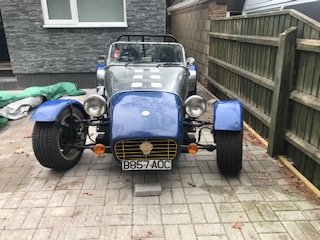-
Posts
1,856 -
Joined
-
Last visited
-
Days Won
98
Content Type
Profiles
Forums
Events
Store
Community Map
Posts posted by brumster
-
-
We have noise tests to adhere to when competing and these generally state 100dB ~ 4500rpm, half a metre away from the exhaust tip (45 degrees). I don't know how sound dissipates with distance, obviously it does, so I guess that 74dB is a kind of pointless number without the context of distance being applied.
"What did Europe ever do for us" etc etc
 <joking, before you all get on your Brexit high horse!>
<joking, before you all get on your Brexit high horse!>
-
My motorbike is 100dB and that's on the manufacturers exhaust
 !? WTF?!
!? WTF?!
-
-
22 minutes ago, zhap135 said:
LOL, yeah, I could just wing it, but my luck dictates that I'd get the thorough chap!
 I see that you have the proper E mark, and not just a BS. Do you remember your supplier?
I see that you have the proper E mark, and not just a BS. Do you remember your supplier?
Yup...
https://www.rhocar.org/index.php?showtopic=41972&p=335327
Not sure if he's still around...
-
I went through great lengths to go through IVA properly with a screen, and it's perfectly doable. Like you say, the important part is supposed to be the marking of the screen with an E marking, in particular the roman numerals to the edge of the circle denote whether the screen is toughened (I) or laminated (II or III).

Cost around £100 for the screen from a template I had to send to the chap (laminated).
I do wonder whether the IVA guy even checked it, to be honest, I *think* he did but I wonder whether it was close inspection or just a glance for an E mark and that was it

-
f f f f f f fkkkk fff ffffrrrr frrrrzzz frrzzznnnn
Actually, it's for the bedroom...
-
Go on mate, I'll have that off you....
-
To answer your question, and as Richy says - yes, you can get only "partial voltage" (to coin your phrase). What you're essentially finding is that if there's a bad connection, you'll get poor voltage. Bad connection means high resistance means low voltage (and warm/overheating conductors!) so you are right to jump on it and investigate

-
3 hours ago, Thrashed said:
Thanks, Will name drop you and see if they can find the template.
It was a couple of years ago now; I didn't buy from them in the end because they were too expensive (IMO!) but he did pull this screen out of the back somewhere and was saying "We always wondered what this was off!", we put it against the template I took them and it was bob on the same, so they made a note. So, yeah... it was "that" screen, if they can remember the whole episode (probably not!)...
-
 1
1
-
-
Ricky Evans has a Zero windscreen template (or at least they did a few years back when I went to them)...
-
 1
1
-
-
Hey Gareth, as promised, slightly better gearbox spreadsheet for you
-
Just to answer the above point, yeah you need a 5-speed casing to put 5 gears in. Actually there's a sandwich section on the type 9 which houses the 5th gear, so it's a development on top of the 4 speed. I am guessing there is probably technically a way of converting a 4 speed to a 5 but no-one would really do it - you'd sell your 4 speed whole.
As for the spreadsheets, mine's as an attachment on this forum, should be shown below now... edit: actually, wait, that's not my latest/best one with the graphs in it. I'll dig it out some time.
-
9 hours ago, garethbowers said:
Hi, ivbe never done any work on a gearbox before but im happy to give it a go. im fairly handy with engines etc. How difficult is it to replace the sets? Do you have a link to the BGT set at all?
cheers
As MrB says, if you can rebuild an engine then a gearbox is perfectly doable if you can follow a set of instructions, be tidy and organised, and keep things clean. You don't really need much by way of special tools except a hub puller and you might need to make a pair of "tongs" to remove the rear layshaft bearing, but these I made out of some bent bits of steel I had kicking about, so hardly challenging.
You can search for lots of material on rebuilding the Type 9 but if you get stuck, PM me and I can send you some articles/guides. They are quite easily found. Search "type 9 rebuild pdf".
BGH (sorry, not BGT, I blame *bleep*e Saturday night TV for hammering that acronym into my head!) Geartech are here :
http://www.bghgeartech.co.uk/html/gear_kits.html
The gearkit you're most likely interested in is the E6 or E7. I had the E6 HD @ £810, plus the lubrication mod to 2nd and 3rd @ £45.
-
Sorry, typo on my part - I meant type 9 5-speed!
-
Got a Caterham 6-speed in mine. Love it; perfect ratios. Boxes are a bit hard to find though.
Other option is just go aftermarket 6-speed sequential like a Quaife but you'll need deep pockets

edit: Actually I should have mentioned my previous solution, which was a Type 5 with a BGT gearset in it. Tall first and shortened 4/5th. It's a good compromise when you factor in the cost. ~£800 for the gearset (assuming you do it yourself), a good halfway house if you need to stick to a budget. Plus there are other reliability improvements in the BGT gearset that make it worthwhile.
-
Slowest desoldering effort EVER

-
 1
1
-
-
Ah ok with you. Ignoring the rear brakes for now, a 41.1mm in the new will give you a slightly higher ratio of m/c to caliper, but you knew that - so expect slightly more travel but more bite for a given pedal pressure. So as long as you're not running out of travel right now, you'd be fine.
As to whether it's worth 4-pots over the standard sliding piston... this is always an emotive decision. Personally I don't see the point on cars weighing as little as ours (my car is perfectly capable of locking itself up on standard 260mm Sierra brakes!) unless you're after better fade performance, but then you can achieve that with discs and/or pad material. Saving on unsprung mass, maybe?
Most of the time I think it's just because people want the bragging rights of 4 pot calipers
 which is fair enough, if that's what people want.
which is fair enough, if that's what people want.
-
 1
1
-
-
14 minutes ago, Monty_CZ said:
but standard sierra caliper is floating, so you have to multiply the area by 2. At leaset it is what they say here: http://brakepower.com/help_abc_27_PAC_t.htm
According the calculation it will be probably 41,1 diameter of piston on fixed wilwood caliper (5304.12 mm^2). This should be to be similar with sierra floating caliper with 60mm piston (5652 mm^2).
I will e-mail them what piston diameter it is.
Ah yes, this is true, if you're comparing all 4 of the pistons then you should multiply the floating caliper result by 2. This is because the piston is only moving half as far to exert pressure on both sides of the caliper (it sort of has a built-in mechanical ratio of 2:1. My mistake.
Still what is your existing caliper size, 60mm seems very large? That's the Cosworth brakes, right? The 280mm discs?
-
I would ask them for the piston diameters and then compare total piston area to that of a standard caliper... I have a spreadsheet for working out brake changes/ratios

if you look here http://www.rallydesign.co.uk/product_info.php?products_id=8317 that caliper is available is 5 bore sizes : 44.5, 41.1, 38.1, 35.1, 31.8mm
The smallest piston size of 31.8mm still gives you a noticeable difference in caliper piston area; 2290mm^2 old versus 3177mm^2 new, so you'll have increased pressure at the pad but at the sacrifice of increased pedal travel. Depends how you are with the current pedal effort/travel. By my reckoning, if you were happy with it as-is then moving to these calipers you'd want a 23.5mm master cylinder to keep the pedal effort/travel the same.
Or fiddle with pedal ratios of course

-
Ahhh so that's where "Kits & Bits" came from....
-
Cool, glad you got it sorted. I think normally I'd say once every 12 months was fine but maybe in light of your experiences you might want to do it every 6 months


-
I am going to go out on a limb and suggest there's probably a varying degree of quality in terms of UJs and propshafts. Depends where the propshaft came from, but maybe it was made "to a budget" (not saying by you, just whoever supplied it)? Or it may be you was just unlucky with this one (it can happen, you just get a "bad one")...
 annoying though. I have a spare prop from Robin Hood somewhere, not sure it's right length, but given your location it's hardly an easy "pop over and collect"
annoying though. I have a spare prop from Robin Hood somewhere, not sure it's right length, but given your location it's hardly an easy "pop over and collect" 
-
...and sold
-
Driveshaft or propshaft? I am guessing from the video you mean propshaft (from gearbox to differential)?
If so, I would only think these need lubricating once a year, if that...





Midlands drive out Sat 14th December
in Chit chat
Posted
I'm up for a little run out - can't be too long, say a couple of hours maximum... run out somewhere for lunch and back?